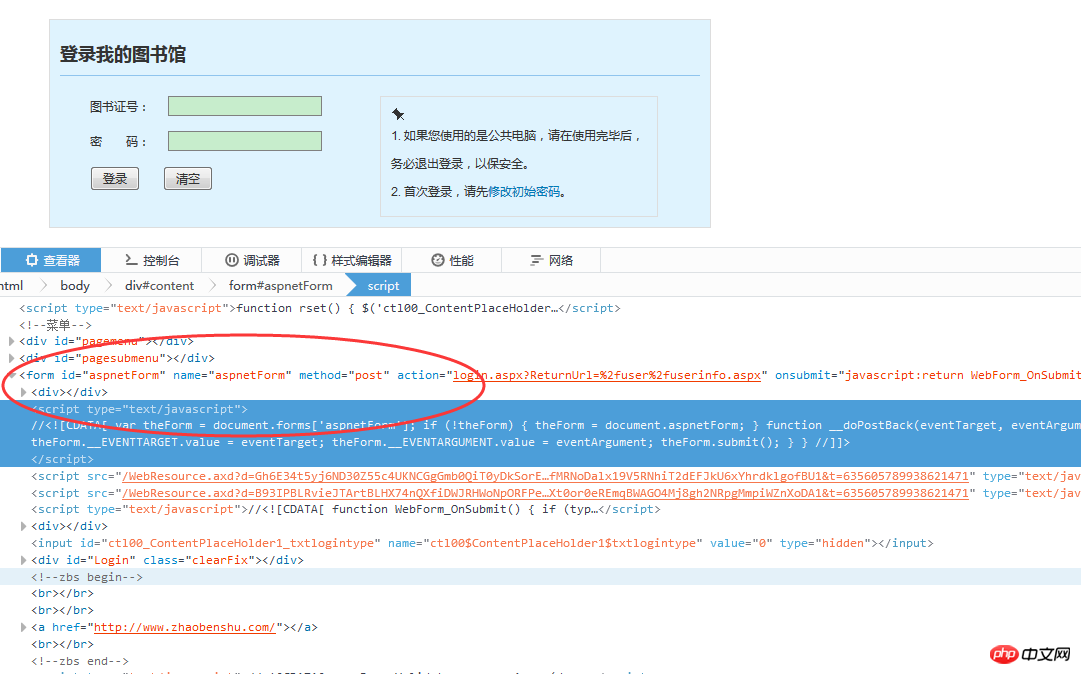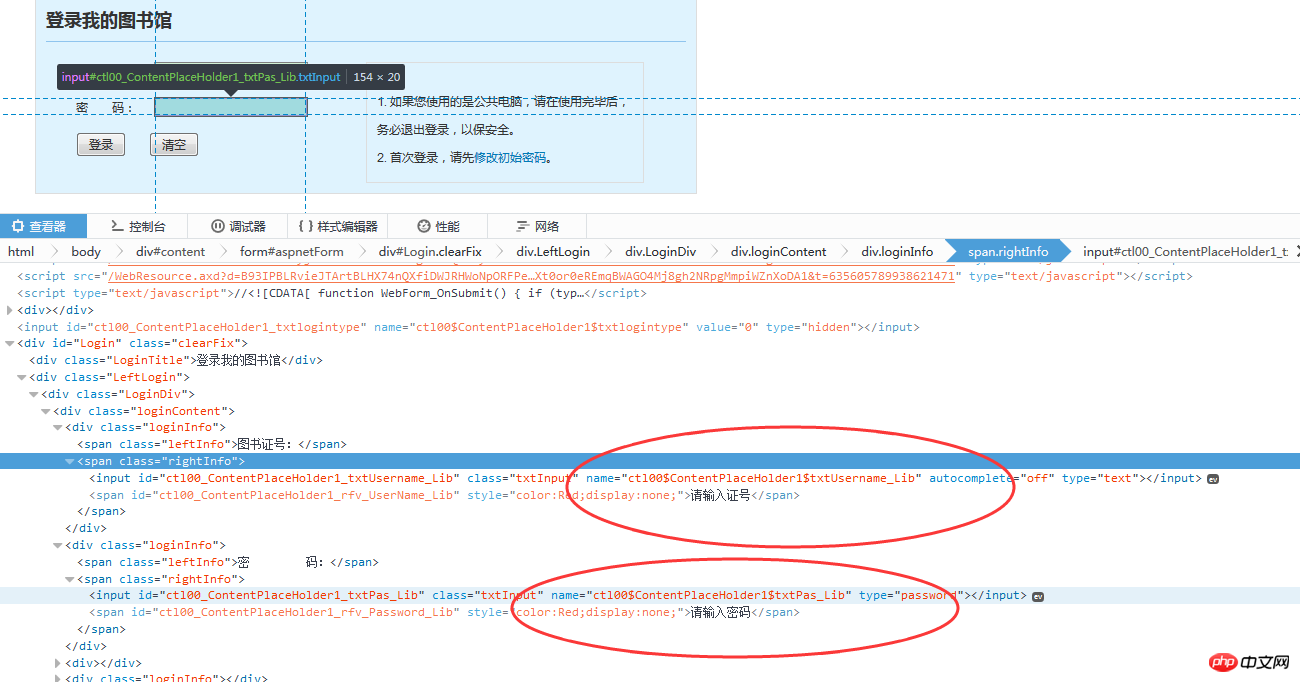python simulation form submission login library
This article mainly introduces in detail the implementation method of python simulation form submission and login library. It has certain reference value. Interested friends can refer to it.
The examples in this article are shared with everyone. The specific code for python simulated login library is for your reference. The specific content is as follows
Principle of simulated form submission:
We all know that Http is stateless, so when we submit The data is the same as that normally submitted in the browser, then the server will return the same response as in the browser. So here we simulate the browser form submission to log in to the library of Guangdong University of Technologyhttp://222.200.122.171:7771/login.aspx,get the cookie, we next visit the book When I enter other pages on the museum website, I will bring this cookie. The server will think that I am a logged-in user and return the data to me normally.
First we use the browser to view the page source code to find the form to be submitted:

Next we need to get the input in the form including hidden, Because hidden will also be submitted along with the form. Find the name corresponding to the account and password. Then we need to fill it in with our own account.

Get all the forms to be submitted After entering the content, replace the account number and password with your own account number and password, submit the request. Get the cookie and save it in the cookie.
The code is as follows (Python2.7 version and Python3 are actually similar):
# -*- coding:utf-8 -*-
import urllib
import urllib2
import cookielib
import bs4
result = urllib2.urlopen("http://222.200.122.171:7771/login.aspx")
soup = bs4.BeautifulSoup(result, "html.parser")
loginp = soup.find("form", attrs={"name": "aspnetForm"})
Allinput = loginp.findAll("input")
inputData = {}
for oneinput in Allinput:
if oneinput.has_attr('name'):
if oneinput.has_attr('value'):
inputData[oneinput['name']] = oneinput['value']
else:
inputData[oneinput['name']] = ""
inputData['ctl00$ContentPlaceHolder1$txtPas_Lib'] = '*****'
inputData['ctl00$ContentPlaceHolder1$txtUsername_Lib'] = '*******'
filename = 'cookie.txt'
# 声明一个MozillaCookieJar对象实例来保存cookie,之后写入文件
cookie = cookielib.MozillaCookieJar(filename)
opener = urllib2.build_opener(urllib2.HTTPCookieProcessor(cookie))
postdata = urllib.urlencode(inputData)
result2 = opener.open("http://222.200.122.171:7771/login.aspx", postdata)
cookie.save(ignore_discard=True, ignore_expires=True)
#登录后 要访问的url
bookUrl = "http://222.200.122.171:7771/user/userinfo.aspx"
result=opener.open(bookUrl)
print result.read()Related recommendations:
Python realizes the automatic reservation function of the library study room
Python Requests simulates login to realize the automatic reservation of library seats
The above is the detailed content of python simulation form submission login library. For more information, please follow other related articles on the PHP Chinese website!

Hot AI Tools

Undresser.AI Undress
AI-powered app for creating realistic nude photos

AI Clothes Remover
Online AI tool for removing clothes from photos.

Undress AI Tool
Undress images for free

Clothoff.io
AI clothes remover

Video Face Swap
Swap faces in any video effortlessly with our completely free AI face swap tool!

Hot Article

Hot Tools

Notepad++7.3.1
Easy-to-use and free code editor

SublimeText3 Chinese version
Chinese version, very easy to use

Zend Studio 13.0.1
Powerful PHP integrated development environment

Dreamweaver CS6
Visual web development tools

SublimeText3 Mac version
God-level code editing software (SublimeText3)

Hot Topics
 1668
1668
 14
14
 1428
1428
 52
52
 1329
1329
 25
25
 1273
1273
 29
29
 1256
1256
 24
24
 PHP and Python: Different Paradigms Explained
Apr 18, 2025 am 12:26 AM
PHP and Python: Different Paradigms Explained
Apr 18, 2025 am 12:26 AM
PHP is mainly procedural programming, but also supports object-oriented programming (OOP); Python supports a variety of paradigms, including OOP, functional and procedural programming. PHP is suitable for web development, and Python is suitable for a variety of applications such as data analysis and machine learning.
 Choosing Between PHP and Python: A Guide
Apr 18, 2025 am 12:24 AM
Choosing Between PHP and Python: A Guide
Apr 18, 2025 am 12:24 AM
PHP is suitable for web development and rapid prototyping, and Python is suitable for data science and machine learning. 1.PHP is used for dynamic web development, with simple syntax and suitable for rapid development. 2. Python has concise syntax, is suitable for multiple fields, and has a strong library ecosystem.
 How to run sublime code python
Apr 16, 2025 am 08:48 AM
How to run sublime code python
Apr 16, 2025 am 08:48 AM
To run Python code in Sublime Text, you need to install the Python plug-in first, then create a .py file and write the code, and finally press Ctrl B to run the code, and the output will be displayed in the console.
 PHP and Python: A Deep Dive into Their History
Apr 18, 2025 am 12:25 AM
PHP and Python: A Deep Dive into Their History
Apr 18, 2025 am 12:25 AM
PHP originated in 1994 and was developed by RasmusLerdorf. It was originally used to track website visitors and gradually evolved into a server-side scripting language and was widely used in web development. Python was developed by Guidovan Rossum in the late 1980s and was first released in 1991. It emphasizes code readability and simplicity, and is suitable for scientific computing, data analysis and other fields.
 Python vs. JavaScript: The Learning Curve and Ease of Use
Apr 16, 2025 am 12:12 AM
Python vs. JavaScript: The Learning Curve and Ease of Use
Apr 16, 2025 am 12:12 AM
Python is more suitable for beginners, with a smooth learning curve and concise syntax; JavaScript is suitable for front-end development, with a steep learning curve and flexible syntax. 1. Python syntax is intuitive and suitable for data science and back-end development. 2. JavaScript is flexible and widely used in front-end and server-side programming.
 Golang vs. Python: Performance and Scalability
Apr 19, 2025 am 12:18 AM
Golang vs. Python: Performance and Scalability
Apr 19, 2025 am 12:18 AM
Golang is better than Python in terms of performance and scalability. 1) Golang's compilation-type characteristics and efficient concurrency model make it perform well in high concurrency scenarios. 2) Python, as an interpreted language, executes slowly, but can optimize performance through tools such as Cython.
 Where to write code in vscode
Apr 15, 2025 pm 09:54 PM
Where to write code in vscode
Apr 15, 2025 pm 09:54 PM
Writing code in Visual Studio Code (VSCode) is simple and easy to use. Just install VSCode, create a project, select a language, create a file, write code, save and run it. The advantages of VSCode include cross-platform, free and open source, powerful features, rich extensions, and lightweight and fast.
 How to run python with notepad
Apr 16, 2025 pm 07:33 PM
How to run python with notepad
Apr 16, 2025 pm 07:33 PM
Running Python code in Notepad requires the Python executable and NppExec plug-in to be installed. After installing Python and adding PATH to it, configure the command "python" and the parameter "{CURRENT_DIRECTORY}{FILE_NAME}" in the NppExec plug-in to run Python code in Notepad through the shortcut key "F6".




